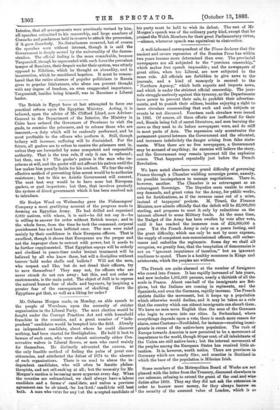A well-informed correspondent of the Times declares that the- ancient
and severe repression of the Russian Press has within two years become more determined than ever. The provincial newspapers are all subjected to the "previous censorship,' which makes free speech impossible ; and the newspapers of great cities, when too Liberal, are now subjected to the same rule. All officials are forbidden to give news to the journals, and a kind of monopoly is secured to the- " Northern Agency," which both exports and imports news, and which is under the strictest official censorship. The jour- nals struggle uselessly against this tyranny, as the Departments. havepower to prevent their sale, to prohibit their advertise- ments, and to punish their editors, besides enjoying a right to- issue circulars commanding that such and such subjects or events be not discussed. Fourteen such circulars were issued in 1882. Of course, all these efforts are ineffectual for their end, Russia being full of secret literature, and men learning the- news as they used to do before newspapers were, and do still in most parts of Asia. The repression only accentuates the- permanent quarrel between the Government and the educated, and increases indefinitely the danger arising from false state- ments. When there are no free newspapers, a Government may be accused of anything; its enemies will believe the story, and the Government may remain ignorant till the explosion comes. That happened repeatedly just before the French Revolution.


































 Previous page
Previous page